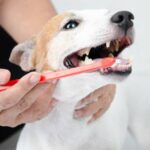It’s easy to remember to brush your teeth every day – you’ve been doing it your whole life, and it’s quickly noticeable when you skip a brushing.
But when it comes to our pets, it’s so much easier to forget. Your cat or dog will never remind you to take care of their teeth, and you may not notice their decline in dental health until it’s too late.
Daily Brushing Helps Our Pets Live Longer
Dr. René Carlson, president of the AVMA, says, “it’s estimated that by the age of two, 80 percent of dogs and 70 percent of cats have some form of periodontal disease.”
That means there’s a strong chance that your pets are in need of a new dental routine.
Dental diseases, left untreated, can affect your pet’s whole body. Bacteria that causes periodontal disease can spread to an animal’s heart, liver and kidneys. For fewer dental bills in the future, you need to make sure you take care of your pets’ teeth while they are young.
Daily brushing is optimal, for the same reasons we humans need to brush our teeth each day. Every time your pet eats – yes, even dry food – sugars from the food feed bacteria that live in your pets’ mouth.
Most pet owners don’t have the time or patience to brush their pets’ teeth on a daily basis. Twice or three times a week is also acceptable. You may also decide to give your pets toys and treats that support dental health. Make sure the treats you buy are meant to prevent the buildup of plaque, instead of just masking your pets’ bad breath.
Brush Your Dog’s Teeth Without The Fuss
It’s easier to stick to a regular brushing routine when your dog doesn’t mind having her teeth and gums examined and cleaned.
Most dogs will tolerate a quick oral cleaning with a canine toothpaste and toothbrush after a slow introduction over a few days or weeks. Make sure you’re using a soft cleaning tool that doesn’t hurt your dog’s teeth or gums. A finger toothbrush is best because they’re typically smaller and more flexible than human toothbrushes.
Brush your dog’s teeth when he or she is calm and relaxed. Gently guide your dog to lay in your lap instead of hovering over them or restraining them. It’s important to make the experience positive for your dog. Lots of praise and petting during and after the cleaning will help.
Yes, Cats Need Dental Training, Too!
Training isn’t just for dogs. Your cat may willingly accept your tooth-brushing efforts, but more realistically, they’re going to put up some resistance, especially if your cat did not learn to tolerate tooth-brushing as a kitten. You’ll need to gradually work with your cat to help him or her become comfortable with you cleaning their mouth.
Begin by putting a small amount of feline toothpaste on a soft-bristled toothbrush or a cotton swab. If your cat does not like their toothpaste, you can begin with the fishy water from a can of tuna, mixing it with the feline toothbrush in smaller ratios until your cat gets used to the taste.
Gently swab the outside of each tooth in a downward motion to swipe tartar and plaque away from your cat’s gums. You do not need to brush the inner surfaces of your cats’ teeth, as their abrasive tongue will keep these parts clean. Your cat might only allow you to brush one tooth before becoming stressed; it may take several weeks for your cat to allow you to thoroughly clean each tooth.
Need help with your pets’ dental health routine?
It’s hard to stick to good dental habits, but luckily, your helpful Concord pet sitters from The Pet Nanny are always here to help. Our customized pet sitting services can include tooth-brushing and giving your pets dental-healthy treats. Get in touch to talk to The Pet Nanny about keeping your pets safe and feeling their best.


Sarah Anderson
May 4, 2016 at 6:42 pm
That is interesting that 80% of dogs and 70% of cats all have a dental disease of sorts. Most people don’t think about their pets dental health, and just assume they will be fine. With the numbers being that high, I wonder why people don’t know at least a little more about it.
Gerald Koons
May 5, 2016 at 3:20 pm
maybe there veterinary should recommend routine dental care maybe as time goes on there will be more affordable plans.